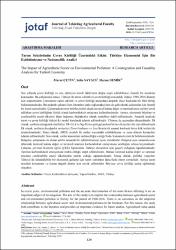| dc.contributor.author | Çetin, Murat | |
| dc.contributor.author | Saygın, S. | |
| dc.contributor.author | Demir, H. | |
| dc.date.accessioned | 2022-05-11T14:04:46Z | |
| dc.date.available | 2022-05-11T14:04:46Z | |
| dc.date.issued | 2020 | |
| dc.identifier.issn | 1302-7050 | |
| dc.identifier.uri | https://doi.org/10.33462/jotaf.678764 | |
| dc.identifier.uri | https://hdl.handle.net/20.500.11776/4767 | |
| dc.description.abstract | In recent years, environmental pollution and the accurate determination of the main factors affecting it are an important subject of investigation. The aim of this study is to explore the relationship between agricultural sector and environmental pollution in Turkey for the period of 1968-2016. There is no consensus on the empirical relationship between agricultural sector and environmental pollution in the literature. For this reason, the study both contributes to the literature and provides an important evidence for future studies. Agricultural value added and agricultural land are preferred as determinants of agriculture while carbon dioxide emission is used as a measure of environmental degradation. In addition, economic growth and renewable energy consumption are added to the models as other independent variables. In empirical analysis, the relationship between agriculture and environmental pollution is estimated by establishing two models. The methodology comprises of three stages. Firstly, the stationarity properties of the series are tested with conventional unit root tests such as DF-GLS and Ng-Perron. In addition, the stationarity levels of the series are investigated by Zivot-Andrews and Lee-Strazicich structural break unit root tests. Secondly, the cointegration between the series and long-run coefficients are estimated by the ARDL model. Lastly, the existence of causality between the series is determined by the Toda-Yamamoto test. The findings points out a cointegration between the underlying series. The findings also reveal that agricultural value added and agricultural land decrease carbon dioxide emission in the long run. The study supports that the environmental Kuznets curve (EKC) hypothesis is valid for the Turkish economy. It is found that agriculture causes carbon dioxide emission. Moreover, it is detected that agricultural value added and agricultural land are the causation of renewable energy consumption. Consequently, policy makers should attach more importance to the agricultural sector for sustainable economic development in Turkey. Additionally, the agricultural lands should be protected and encouraged for value added manufacturing. Thus, environmental pollution will tend to decrease. © 2020 Namik Kemal University - Agricultural Faculty. All rights reserved. | en_US |
| dc.language.iso | tur | en_US |
| dc.publisher | Namik Kemal University - Agricultural Faculty | en_US |
| dc.identifier.doi | 10.33462/jotaf.678764 | |
| dc.rights | info:eu-repo/semantics/openAccess | en_US |
| dc.subject | Agriculture | en_US |
| dc.subject | Ardl | en_US |
| dc.subject | Carbon dioxide emission | en_US |
| dc.subject | Structural break | en_US |
| dc.subject | Turkey | en_US |
| dc.title | Tarım Sektörünün Çevre Kirliliği Üzerindeki Etkisi: Türkiye Ekonomisi İçin Bir Eşbütünleşme ve Nedensellik Analizi | en_US |
| dc.title.alternative | The impact of agricultural sector on environmental pollution: A cointegration and causality analysis for Turkish economy | en_US |
| dc.type | article | en_US |
| dc.relation.ispartof | Journal of Tekirdag Agricultural Faculty | en_US |
| dc.department | Fakülteler, İktisadi ve İdari Bilimler Fakültesi, İktisat Bölümü | en_US |
| dc.identifier.volume | 17 | en_US |
| dc.identifier.issue | 3 | en_US |
| dc.identifier.startpage | 329 | en_US |
| dc.identifier.endpage | 345 | en_US |
| dc.institutionauthor | Çetin, Murat | |
| dc.institutionauthor | Saygın, S. | |
| dc.institutionauthor | Demir, H. | |
| dc.relation.publicationcategory | Makale - Uluslararası Hakemli Dergi - Kurum Öğretim Elemanı | en_US |
| dc.authorscopusid | 57217859668 | |
| dc.authorscopusid | 57219914263 | |
| dc.authorscopusid | 57219221304 | |
| dc.identifier.wos | WOS:000569114000006 | en_US |
| dc.identifier.scopus | 2-s2.0-85096046098 | en_US |



















